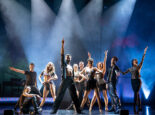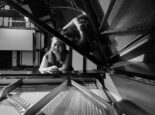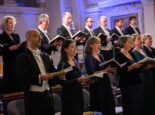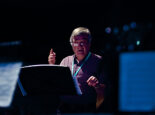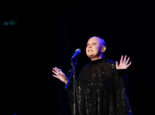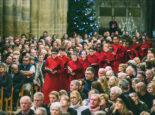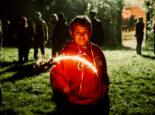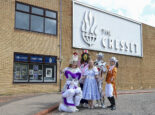Chris Wood: ‘If I’d gone for an electric guitar, it’d be an entirely different story, but I couldn’t afford it’
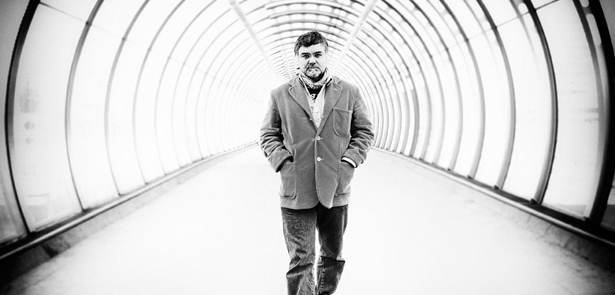
One of the great champions of English folk music, guitarist, fiddler and singer Chris Wood has played in duos, trios and just about every other kind of ensemble – including the folk supergroup The Imagined Village, alongside Billy Bragg and Martin and Eliza Carthy. But more recently, it’s been his solo albums that have grabbed attention, winning him Song of the Year, Album of the Year and Folk Singer of the Year (twice) at the BBC Radio 2 Folk Awards. Last year, another song – the title track of his latest album, None The Wiser – was nominated for Song of the Year. He performs at the Key Theatre on 27 September. Toby Venables talked to him
You’ve won a fair few awards now – what do they mean to you?
The thing about awards is that you can’t let them mean too much to you, because if you let them mean a great deal to you when you win one, it will mean a great deal when you don’t win one. You have to keep a bit of perspective on all those awards… They’re basically something that has been dreamt up by the industry to help things churn along, and in that way they make a lot of sense. Even if they’re controversial it get people talking about them, which is great. But they’re very nice to receive, especially some of the kind of alternative awards, where they just let the people vote – refreshingly straightforward! They’re the only bits of publicity that I get really. I don’t spend money on publicity, so you won’t really see my name around that much, but then I get an award and people go ‘Oh! Who’s he? I thought he played mid-field for Leicester…’
You’ve had excellent press for None the Wiser. Do you have similarly mixed feelings about reviews?
Ever since I’ve been making albums, the press have all been very kind to the music I’ve made. Everything I’ve done has received really good reviews, which makes me think either I’m a genius or the press are idiots. Must be somewhere in between… But they’ve been very kind, and it’s hard not to get a bit blasé, expecting everyone to say nice things, but it does well to keep that in perspective as well.
Is it true that an art teacher once said you had ‘a remarkable eye for trivia’?
I was at art college, and I kind of fell out with one of the tutors – several of the tutors really. Story of my life! But the way I felt was that she was a really good graphic artist but she was hopeless at conveying it – hopeless at actually teaching. I mean, you have to know your subject, but you’ve also got have to have this ability to get across the understanding and appreciation, and this poor benighted woman was just going through the motions. So I must have kicked up a stink or something, and had to go before the head man at the college, who, as far as I can work out was an old spy interrogator. He sort of chain smoked, and looked like John Hurt in Tinker, Tailor, Soldier, Spy – this wrinkled, creased, tobacco stained wise old owl. And he got me to show him all my work. When I’d finished, he just said: ‘Hmm. You have a remarkable eye for trivia…’ If I’d been a more sensitive soul I’d have caved in or something, but as soon as he said that I thought: ‘Yeah… Don’t you?’ Isn’t that what artists do? ****ing hell – look at Monet’s waterlilies! If that’s not an eye for small things, the minutiae, then what is? His line was not to paint the thing, but to just paint whatever it is you see, so if he saw a patch of ochre, he would simply put in a patch of ochre, then next to that might be a patch of turquoise. He’d stand back at the end of the day and there would be a painting that he was almost seeing for the first time. That’s what people mean when they say about being too close to something, but you have to let go of the bigger picture in order to attend to the small stuff.
That ‘remarkable eye for trivia’ seems to fit perfectly the glimpses of ordinary life that you get in None the Wiser, which somehow become something startling and special…
If you go back to the Monet thing, he paints this patch of ochre which on its own doesn’t mean very much. But he paints another bit next to it and another next to that, and eventually these little things that don’t necessarily mean very much come together and form something that does mean something, and that’s the story of folk music in any country. You see something, it doesn’t mean much – you overhear some girl on her phone saying how she’s got a job doing phone sex so she can pay her student loan back. But then you hear something else, another day, in another town. There’s that line in the song: I saw a young lad and his mum, he all but held her hand as they went into the Army recruiting centre. Well, in Bristol there’s a ****ing great big army recruiting centre, and they have this thing where they can recruit lads at sixteen, but they have to have their parents with them. And I was just walking along, you know, and saw this kid and thought ‘Christ, he looks a bit young to be going in there…’ So I just waited outside and kind of mooched around, and I could hear some of the younger lads as they were coming out. It was some kind of schools induction day, and they were coming out talking about the money they’d earn. On it’s own it was nothing, but put together with the other little things you kind of realise that something is going on. There’s not a word in that song that’s not completely true – it’s all stuff I saw, or heard or that hapened to me.
Do you make notes of what you see and hear?
Yes – I’ve got about five notebooks. You just have to learn how to read these things. You see a man and a woman, the way they’re standing, and you know what’s going on. Or you look at them and you don’t know what’s going on – it’s something much more complicated. I got off a train one day in Victoria, on this very busy platform, and I saw this old couple there. And the old woman slapped the old man across the face, and he caught my eye as it happened. Nobody else had noticed. But the shame in his face… And you could see in his eye that he was used to that, used to being bullied. But it happened that fast, and then I walked on. It’s all around us, the stuff for the songs.
How did you first become involved with music?
I started doing proper music when I was about eight, singing in the church choir. The choirmaster from the local church used to come round and see if there were any good boys voices. He’d play a note on the piano and you had to sing it, you know. And I could just do it – I could sing it, hear it. It turned out he was a brilliant choral teacher. The thing about the choirs schools is that they kept going. All through the Reformation and when Cromwell was knocking heads of statues they kept singing going, so it was an unbroken line of 1,100 years. They really knew how to get the best out if us. It was all downhill from there! That was probably the finest music I’ve ever made – Bach, Handel, Gibbons, Boyce, Tallis… Amazing music.
How did that lead to folk?
When I was at school I started playing the guitar, and again a talent scout came around – this time from the local folk club – and heard me playing Scarborough Fair. And he said: ‘Come down to the folk club…’ If I’d gone for an electric guitar, it’d be an entirely different story, but I couldn’t afford it. But it was also the time on James Taylor, and Simon and Garfunkel. Plus there was this ability to pluck the strings on an acoustic guitar and get instant polyphony. And Simon and Garfunkel described Scarborough Fair as a canticle, and it is very close to a piece of church music, so it made a kind of sense. And the folk club was just in a pub. There was this chair in the corner, and someone would go and sit in it and sing. It was that simple – no smoke and mirrors, or glitz or glam. They just made music, and the music was the star. And that was what was familiar from church – it wasn’t about personalities, it wasn’t about all that others stuff. And in folk people are singing the work of Anon, so it’s not even about the composer. The greatest composer who ever lived is Anon. So there was something that really went in deep for me.
How did you get into writing songs?
Well, it was my daughter and my wife who told me I should be doing my own solo albums. Up until then I’d always played in duos, or trios or quartets. They had more faith in me than I did. I got a note from my daughter one morning – she can’t have been more than about seven – which said ‘Dear Mr Wood, it has come to our attention that as of this moment you have not yet released a solo record’. That was April 3rd 2005 – I’ve still got it somewhere. So her song is one of the songs on the first album. It was just lack of faith. I didn’t pass the eleven plus, and went to secondary modern. And if you didn’t pass your eleven plus in Kent that was kind of it for you, you went to a sink school. Just as the public school system instils confidence – people like Cameron and Johnson have nothing but confidence – so the sink schools undermine it, producing people who expected stuff to be just a little bit s****. So I didn’t have the confidence to think I could do it. Writers, in my universe, were the highest of the high. They actually made something.
The Imagined Village was in some respects the absolute antithesis of that pared down, simple sound you’ve described. What attracted you to that?
In some ways it was a perfectly natural thing. It was just Simon Emmerson playing with his friends, and Simon’s friends are all kinds of musicians – all British musicians, but it just happens that their roots are in different places. It was very simple, and very natural, I think. Andy Gangadeen was laying down these amazing, crazy dubstep mental rhythms that he does, then Sheila Chandra was singing these great big beautiful ballads, Eliza Carthy doing her thing, me doing my thing, Martin Carthy – 70 years old – up on stage with all these different kinds of players. Why would you say no? But it wasn’t a band in the normal sense of the word – it was always a kind of pot-pourri. A fruit salad! It’s like the Monet thing again; Martin was that little patch of ochre, and Andy Gangadeen was that big splodge of black, and so on. Simon Emmerson was like a circus ringmaster with a chair and a whip, but somehow he got it into the kind of shape where we could go out and do a gig or two. I know a lot of people didn’t like, but it was a good thing to do. If you do what you’ve always done, you’ll get what you’ve always got.
You trained as an artist and use many artistic analogies. Do you consider yourself an artist?
I think what I do is closer to craft than art. I’m not an artist. Alan Bearman – my agent – was invited to write some sleeve notes for an anthology of my stuff that was put out, and he said something like: ‘Chris is always genuinely surprised when anyone turns up to one of his gigs or buys one of his CDs, yet believes passionately that they should’. And he’s got me completely banged to rights!
Chris Wood appears at the Key Theatre on 27 September 2014
For more information, visit www.vivacity-peterborough.com








